AWM41 1046 - [Nurses Narratives] Sister E L Steadman - Part 1
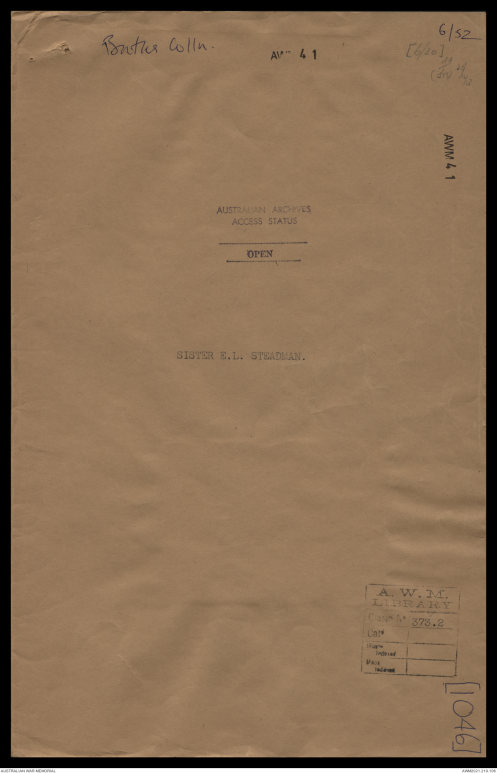
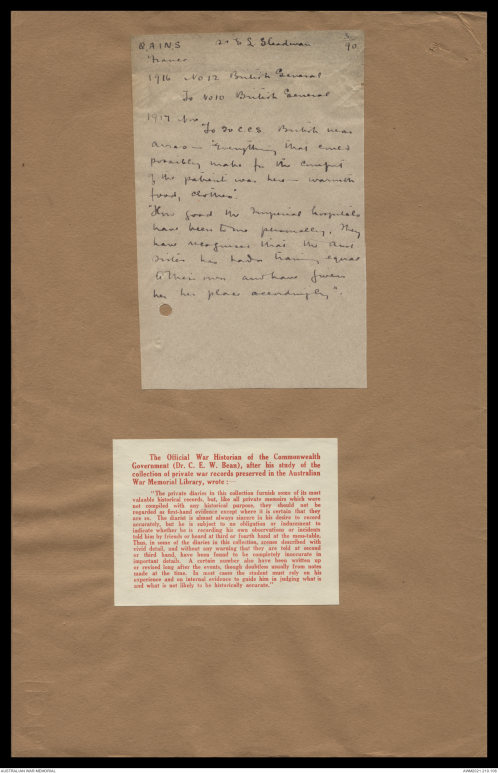
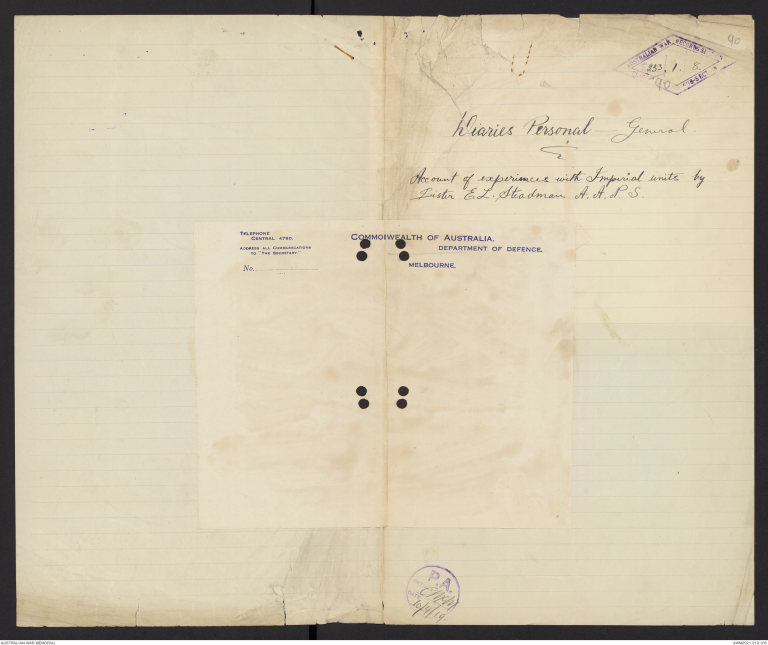
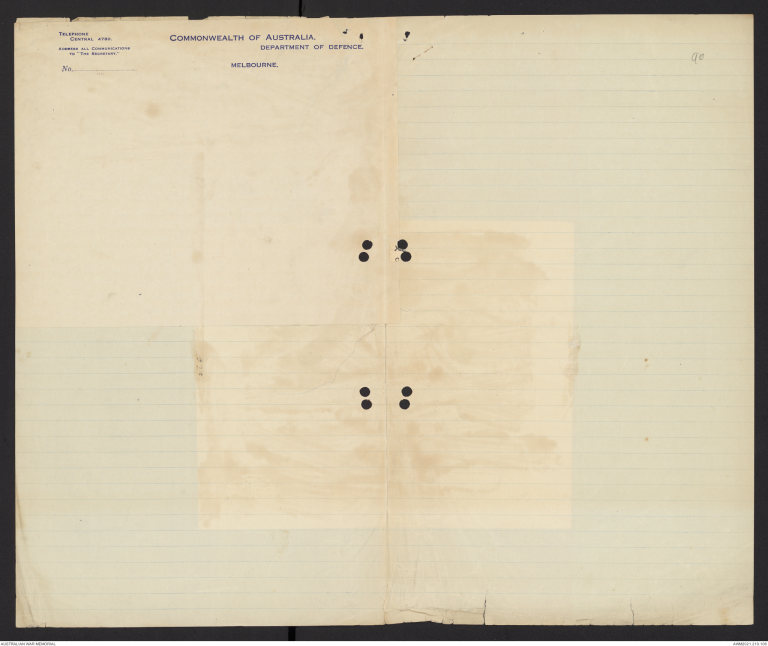
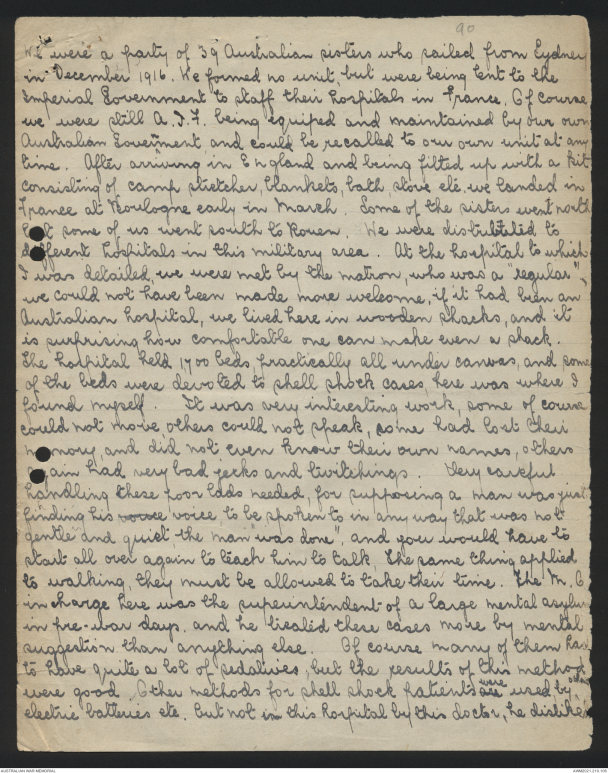
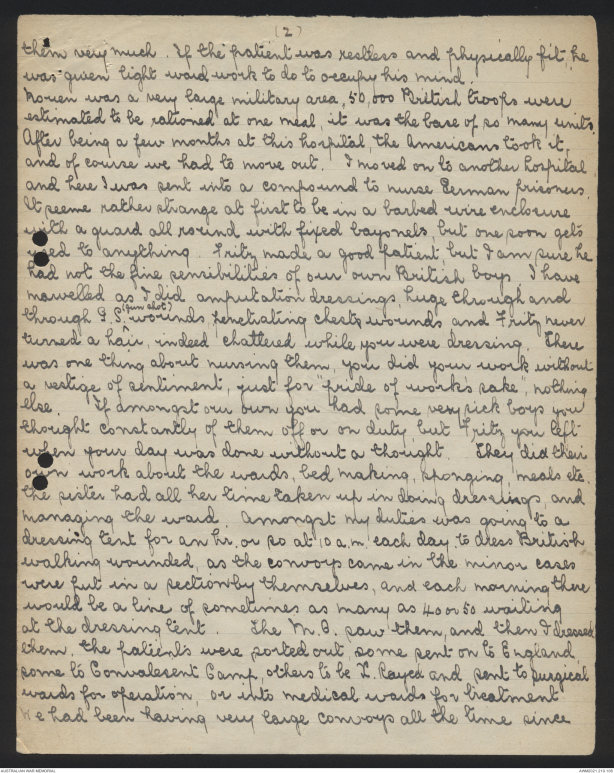
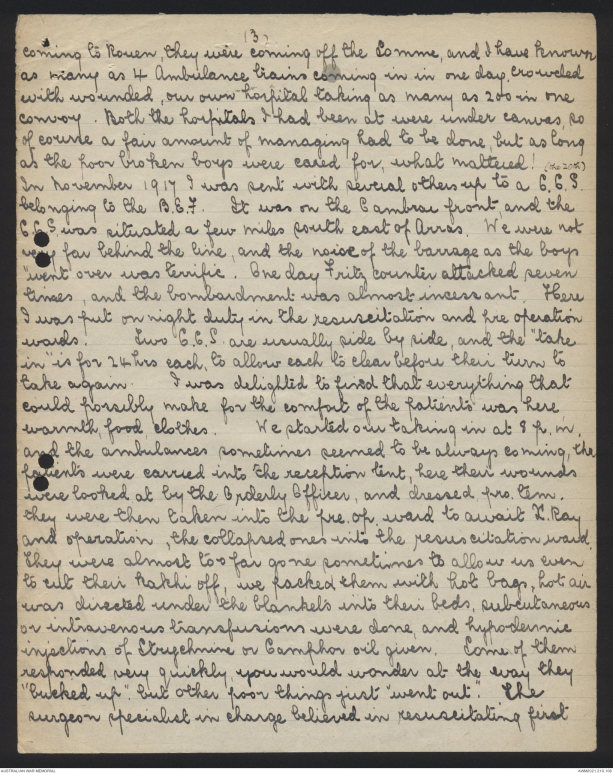
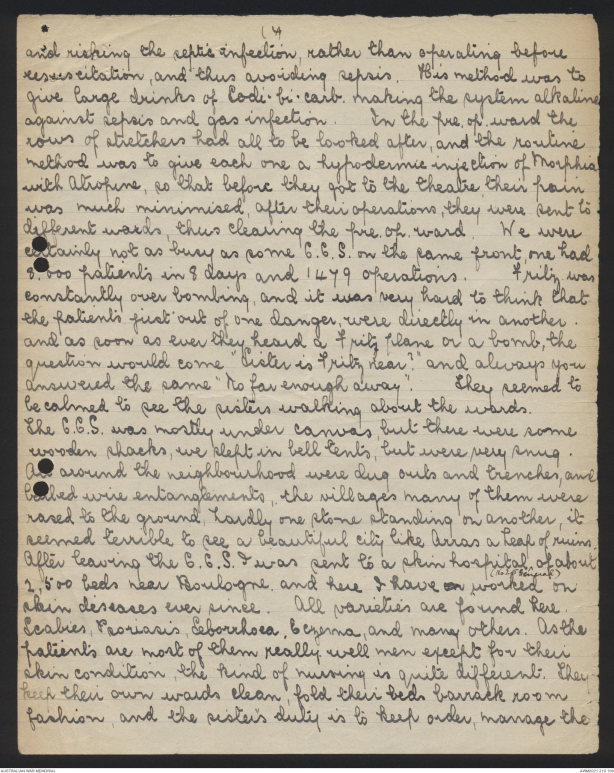
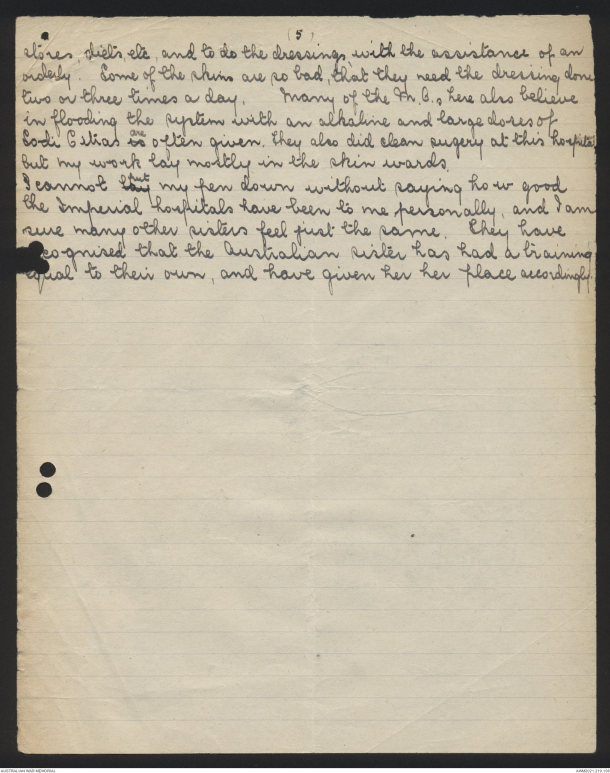
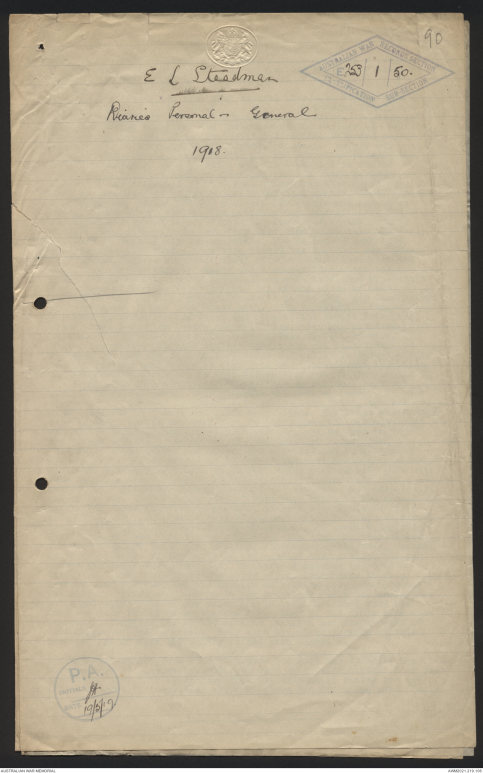
Butler Colln 6/52
AWM 41 [6/20]
[[? ]]
AWM 41
AUSTRALIAN ARCHIVES
ACCESS STATUS
OPEN
SISTER E.L. STEADMAN.
373.2
[1046]
Q.A.I.N.S Sr. E.L. Steadman 3/90
France
1916 No 12 British General
to No 10 British General
1917 [?]
To 20 C.C.S. British near
Arras - Everything that could
possibly make for the comfort
of the patient was here - warmth
food, clothes"
"How good the Imperial hospitals
have been to me personally. They
have recognised that the Aust
sister has had a training equal
to their own and have given
her her place accordingly".
The Official War Historian of the Commonwealth
Government (Dr. C. E. W. Bean), after his study of the
collection of private war records preserved in the Australian
War Memorial Library, wrote:-
"The private diaries in this collection furnish some of its most
valuable historical records, but, like all private memoirs which were
not compiled with any historical purpose, they should not be
regarded as first-hand evidence except where it is certain that they
are so. The diarist is almost always sincere in his desire to record
accurately, but he is subject to no obligation or inducement to
indicate whether he is recording his own observations or incidents
told him by friends or heard at third or fourth hand at the mess-table.
Thus, in some of the diaries in this collection, scenes described with
vivid detail, and without any warning that they are told at second
or third hand, have been found to be completely inaccurate in
important details. A certain number also have been written up
or revised long after the events, though doubtless usually from notes
made at the time. In most cases the student must rely on his
experience and on internal evidence to guide him in judging what is
and what is not likely to be historically accurate".
90
253.1.8
Diaries Personal - General
Account of experiences with Imperial units by
Sister E.L. Steadman A.A.P.S.
(COMMONWEALTH OF AUSTRALIA
DEPARTMENT OF DEFENCE
MELBOURNE letterhead - blank)
[[?]]
10/4/19
(Commonwealth of Australia Letterhead - blank)
We were a party of 39 Australian sisters who sailed from Sydney
in December 1916. We formed no unit, but were being sent to the
Imperial Government to staff their hospitals in France. Of course
we were still A.I.F. being equiped and maintained by our own
Australian Government and could be recalled to our own unit at any
time. After arriving in England and being fitted up with a kit
consisting of camp stretcher, blankets, bath, stove etc, we landed in
France at Boulogne early in March. Some of the sisters went north
but some of us went south to Rouen. We were distributed to
different hospitals in this military area. At the hospital to which
I was detailed, we were met by the matron, who was a "regular",
we could not have been made more welcome, if it had been an
Australian hospital, we lived here in wooden shacks, and it
is surprising how comfortable one can make even a shack.
The hospital held 1,700 beds, practically all under canvas, and some
of the beds were devoted to shell shock cases, here was where I
found myself. It was very interesting work, some of course
could not move others could not speak, some had lost their
memory, and did not even know their own names, others
again had very bad jerks and twitchings. Very careful
handling these poor lads needed, for supposing a man was just
finding his xxxx voice to be spoken to in anyway that was not
gentle and quiet, the man was done," and you would have to
start all over again to teach him to talk, the same thing applied
to walking, they must be allowed to take their time. The M.O.
in charge here was the superintendent of a large mental asylum
in pre-war days and he treated these cases more by mental
suggestion than anything else. Of course many of them had
to have quite a lot of sedatives, but the results of this method
were good. Other methods for shell shock patients are were used by, ∧ others
electric batteries etc. but not in this hospital by this doctor, he disliked
(2)
them very much. If the patient was restless and physically fit, he
was given light ward work to do to occupy his mind.
Rouen was a very large military area, 50,000 British troops were
estimated to be rationed at one meal, it was the base of so many units.
After being a few months at this hospital, the Americans took it,
and of course we had to move out. I moved on to another hospital
and here I was sent into a compound to nurse German prisoners.
It seemed rather strange at first to be in a barbed wire enclosure
with a guard all round with fixed bayonets, but one soon gets
used to anything. Fritz made a good patient, but I am sure he
had not the fine sensibilities of our own British boys. I have
marvelled as I did amputation dressings, huge through and
through G.S.∧ (gun shot) wounds penetrating chests wounds and Fritz never
turned a hair, indeed chattered while you were dressing. There
was one thing about nursing them, you did your work without
a vestige of sentiment, just for "pride of work's sake", nothing
else. If amongst our own you had some very sick boys you
thought constantly of them off or on duty, but Fritz you left
when your day was done without a thought. They did their
own work about the wards, bed making, sponging, meals etc
the sister had all her time taken up in doing dressings, and
managing the ward. Amongst my duties was going to a
dressing tent for an hr. or so at 10a.m. each day to dress British
walking wounded, as the convoys came in the minor cases
were put in a section by themselves, and each morning there
would be a line of sometimes as many as 40 or 50 waiting
at the dressing tent. The M.O. say them, and then I dressed
them, the patients were sorted out, some sent on to England,
some to Convalesent Camp, others to be X Rayed and sent to surgical
wards for operation, or into medical wards for treatment.
We had been having very large convoys all the time since
(3)
coming to Rouen, they were coming off the Somme, and I have known
as many as 4 Ambulance trains coming in in one day, crowded
with wounded, our own hospital taking as many as 200 in one
convoy. Both the hospitals I had been at were under canvas, so
of course a fair amount of managing had to be done, but as long
as the poor broken boys were cared for, what mattered!
In November 1917 I was sent with several others up to a C.C.S. (the 20th)
belonging to the B.E.F. It was on the Cambrae front, and the
C.C.S. was situated a few miles south east of Arras. We were not
very far behind the line, and the noise of the barrage as the boys
"went over was terrific. One day Fritz counter attacked seven
times, and the bombardment was almost incessant. Here
I was put on night duty in the resuscitation and pre operation
wards. Two C.C.S. are usually side by side, and the "take
in" is for 24hrs each, to allow each to clear before their turn to
take again. I was delighted to find that everything that
could possibly make for the comfort of the patients was here,
warmth, food, clothes. We started our taking in at 8 p.m.
and the ambulances sometimes seemed to be always coming, the
patients were carried into the reception tent, here their wounds
were looked at by the Orderly Officer, and dressed pro tem.
they were then taken into the pre. op. ward to await X. Ray
and operation, the collapsed ones into the resuscitation ward.
They were almost too far gone sometimes to allow us even
to cut their kakhi off, we packed them with hot bags, hot air
was directed under the blankets into their beds, subcutaneous
or intravenous transfusions were done, and hypodermic
injections of Strychnine or Camphor oil given. Some of them
responded very quickly, you would wonder at the way they
"bucked up", but other poor things just "went out". The
surgeon specialist in charge believed in resuscitating first
(4)
and risking the septic infection, rather than operating before
resuscitation, and thus avoiding sepsis. This method was to
give large drinks of Sodi-bi-carb making the system alkaline
against sepsis and gas infection. In the pre. op. ward the
rows of stretchers had all to be looked after, and the routine
method was to give each one a hypodermic injection of Morphia
with Atropine, so that before they got to the theatre their pain
was much minimised, after their operations, they were sent to
different wards, thus clearing the pre. op. ward. We were
certainly not as busy as some C.C.S. on the same front, one had
8,000 patients in 8 days and 1479 operations. Fritz was
constantly over bombing, and it was very hard to think that
the patients just out of one danger, were directly in another
and as soon as ever they heard a Fritz plane or a bomb, the
question would come "Sister is Fritz near?" and always you
answered the same "No far enough away". They seemed to
be calmed to see the sisters walking about the wards.
The C.C.S. was mostly under canvas, but there were some
wooden shacks, we slept in bell tents, but were very snug.
All around the neighbourhood were dug outs and trenches, and
barbed wire entanglements, the villages many of them were
rased to the ground hardly one stone standing on another, it
seemed terrible to see a beautiful city like Arras a heap of ruins.
After leaving the C.C.S. I was sent to a skin hospital (No 2 General) of about
2,500 beds near Boulogne, and here I have on worked on
skin diseases ever since. All varieties are found here
Scabies, Psoriasis, Seborrhoea, Eczema and many others. As the
patients are most of them really well men except for their
skin condition, the kind of nursing is quite different. They
keep their own wards clean, fold their beds barrack room
fashion, and the sister's duty is to keep order, manage the
(5)
stores, diets, etc, and to do the dressings, with the assistance of an
orderly. Some of the skins are so bad, that they need the dressing done
two or three times a day. Many of the M.O's here also believe
in flooding the system with an alkaline and large doses of
Sodi Citras is are often given. They also did clean surgery at this hospital
but my work lay mostly in the skin wards.
I cannot lay put my pen down without saying how good
the Imperial Hospitals have been to me personally, and I am
sure many other sisters feel just the same. They have
recognised that the Australian Sister has had a training
equal to their own, and have given her her place accordingly.
90
253/1/50.
E.L. Steadman
Diaries Personal in General
1918.
19/5/19
 Sam scott
Sam scottThis transcription item is now locked to you for editing. To release the lock either Save your changes or Cancel.
This lock will be automatically released after 60 minutes of inactivity.